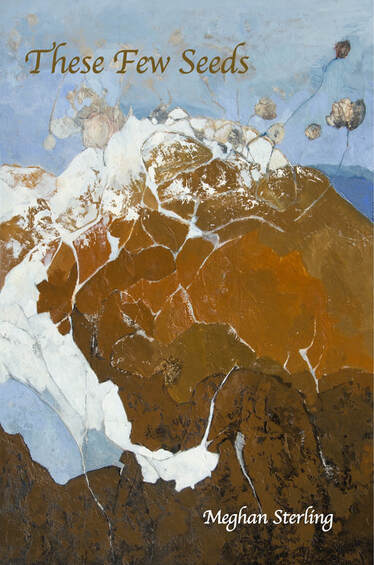These Few Seeds
These Few Seeds
by Meghan Sterling.
Terrapin Books, 2021,
75 pages, paper, $14,72,
ISBN: 978-1-947896-39-0
How does one justify bringing a child into a world of conflict and impending catastrophe ? This is the question Meghan Sterling takes on in her debut collection, These Few Seeds. Even knowing she can’t help but leave her daughter a troubled legacy, Sterling’s overall message is one of resilience and hope.
The poet presents the challenges both collective and individual that are likely to face any human child of the twenty-first century, “whose earth may be scorched / with flames.” She laments “the sad, slow / wash of water as it runs / toward an ocean that’s rising, rising.” Sterling enlarges this sense of foreboding with far-ranging geography and history. Helsinki, Portugal, Australia, and Syria provide the settings for some of these poems. In “The Deeper We Dig,” for example, the poet remembers, and even becomes, her grandmother in a time of conflict, confronting part of her own painful legacy:
I dream I am my grandmother, her face looking back at me
in the train car window, the train rushing into a mountain
in Ukraine, a place we fled before the first World War,
with the Anna Karenina train cars, with the Slavic language
In “Jew(ish),” Sterling claims first only “small traces” of that heritage, but then builds a connection to Jewishness with sensory details such as “a quality of air, like cigar smoke” and “the smell of hair oil.” Through these accumulated sensations the speaker convinces herself and the reader that, despite her secularity, she must own the “dust / of all the dead and the smoke like ghosts.”
As these heritage concerns and the dangers of climate change are part of the mother’s legacy, so too are her more specific human woes. “How Many Times” recalls a former lover when she hears that “the bone-white finger” of heroin “got him at last.” “The Ferryman” describes an abuser who “tried to drown me with force.” In Sterling’s deft hands these losses are part of the collective suffering of the world, and among the experiences her child may have to face.
The poet / mother counters the weight of such a legacy with an almost mythic connection to nature. In “All That I Have Is Yours,” it was the creek and the finches that urged her “to make” her daughter. In “Bliss” she describes pregnancy and the child’s birth as a geological event. The child is first a “mountain inside,” and next, a whale. Then, as though the sea is not large enough, the child becomes the night sky. Even a poem about an ordinary toddler event, “Puddle Jumping,” presents the mother as a part of the earth. When the daughter reaches for her, the mother’s “hand grew out of the earth” as if it were “tree branch, root.”
Finally, acknowledging an earth that may soon be wilting “under the heat of a too-near sun,” the mother passes on nature’s toughness to her beloved child.
to you I bequeath
all the courage
of birds and flowers,
water and stones,
to love enough,
to love with the toughness of trees.
The collection closes with an echo of this inheritance. The poet also bequeaths “these few seeds” which she nudges “into flower as apology.” Seeds represent the hope of rebirth, of continuation, and refer as well to the poems in this book, memories about how much this daughter is loved and where she comes from. The cover art relates to the theme of inheritance. “Snowmelt,” by Betty Schopmeyer, a patchwork of brown, white and blue, earth and sky with clumps of snow, is a close-up of the earth in spring, more abstract than representational, but, like the poems in These Few Seeds, layered, inviting, and ultimately hopeful.
— Jeri Theriault


